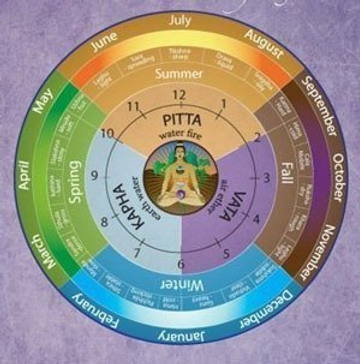Effect of Dosha Kala and Metabolism on Weight Loss

Effect of Dosha Kala and Metabolism on Weight Loss
What is metabolism?
In today’s modern era we have often heard about ‘Metabolism’. Metabolism is the body process which comprises both anabolism and catabolism. Catabolism is the process of breaking down complex molecules into simpler units. In this process there is energy generation.
Anabolism is the antagonistic process to catabolism in which synthesis or build-up aspect of metabolism occurs. These processes are continuously occurring in the body, however, time duration of the day has an impact on the rate of metabolism. The key to weight loss success may be understanding how your metabolism really works. It’s necessary to understand the dosha kala effect on metabolism. Eating the right amount, the right kind of food and at the right day time(Dosha kala) will help in weight management.
Ayurveda divides 24 hours into groups wherein one particular Dosha is dominant. So, how is the division made:

“Early to rise and early to bed makes a man healthy, wealthy and wise.”
We have been bombarded with such phrases from our childhood.
We can relate to such phrases now during modern new norms.
Ayurveda dosha kala(day time) and metabolism(body processes) are two equal and important sides of well being and healthy eating.
Kapha Kala and its effect on metabolism:

According to ancient Ayurveda science our ancestors have educated us about the “Dosha clock”.
In the modern science era we can connect this with metabolism which is nothing but biological clock.
As the period from 6 AM to 10 AM is Kapha Kala(Kapha time) and 6 PM to 10 PM as well, we need to rise early and perform physical activities like yoga, cardio, stretching to metabolise fat tissue. Imbalanced metabolism affects proper nourishment of kapha and meda dhatu/ fat tissues which results in obesity or weight gain.
If we rise early and perform physical activities, the Kapha will not get aggravated and the stored meda dhatu(fatty tissue) will be utilised and ultimately will help in weight loss.
In this period we should eat foods which will eliminate kapha and help in reducing it.
Easily digestible food should be consumed during kapha kala as the digestive fire and Digestive Quotient (EQ) is not very low (Mand agni) during this period . During evening kapha kala light and early dinner is advisable. Less exertion physical activities, yoga, relaxation therapies are most preferable.
For example: Tulsi mint Green tea, Ginger Tulsi tea, Cinnamon tea.
By rising early in the morning emotional quotient(EQ) increases as well. It makes the person wise with a better presence of mind.
In aspects of nutrition science too, as we rise early in the morning our metabolism gets a boost. By performing physical activities in the morning, our body secretes happy feeling hormones like serotonin and endorphins. These keep us active throughout the day and thus helps in proper functioning of physiology.
Pitta Kala and its effects on metabolism:

The period of Pitta kala is from 10 AM to 2 PM and 10 PM to 2 AM. Ayurveda science has mentioned that the digestive fire(Agni) is intense during pitta kala and hence foods that are Guru(heavy to digest) can be consumed during this period for better nourishment and balanced metabolism. Thus lunch should be the major meal of the day.
According to the new norm, some people practice having brunch in their routine which is a good way to keep the digestive fire in balance. Foods like chapati, stuffed parathas, basundi(rabadi), puran poli, chole, rajma, paneer can be consumed and easily digested in this period rather than during other dosha kala.
The pitta kala from 10 pm is well known for rejuvenation and healing process of the body. Hence sound sleep is essential for the body to build new cells and repair the wear and tear. One should not consume food or perform any physical activity during this period.
Vata Kala and its effects on metabolism:

Vata Kala begins from 2PM to 6 PM and from 2 AM to 6AM. After this there is Vata kala in which the Pachan(digestion process) continues and helps in assimilation of food. During this period no heavy meals but moist and warm foods should be consumed.
We should not consume foods which create dryness like Bhel of puffed rice, namkeen, farsan, breads, chola, rajma, potato and its products during this period.
For example- pomegranate, dry figs, walnuts and infused waters like amla- ginger infused water is advisable
There is a relation between metabolism and Dosha kala. At Turyaa platform we suggest lifestyle modifications and many recipes according to prakruti of individuals, Dosha kala of the day, health complaints and the goal to be achieved . To know more about recommendations according to metabolism, recipes and their benefits for weight loss please connect with our certified wellness coaches at our website www.turyaawellness.com.
Author-
Archana Patil and Dr. Shillpa Jamdarkhana
Credits-
Dr.Tejaswini Bhale and Shruti Kulkarni
#Metabolism #Weightloss #fatloss #Doshakala #Daytime #Perfectmealtime #Ayurvedanutriaspects #Anabolism #Catabolism #Dipan #Pachan #Biologicalclock #EmotionalQuotient #Kaphakala #Pittakala #Vatakala
For regular updates, like and follow:

